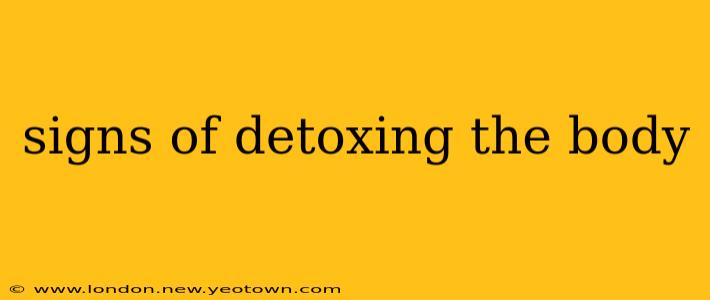Detoxing. The word conjures images of juice cleanses and restrictive diets, but the truth is, our bodies are constantly detoxifying themselves. Our liver, kidneys, skin, and lymphatic system work tirelessly to filter out toxins, whether from pollution, processed foods, or stress. But sometimes, this natural process can become more noticeable, revealing itself through various signs. This isn't a medical diagnosis, but rather an exploration of potential indicators that your body might be working extra hard to eliminate impurities.
What are the common signs of detoxing?
This is a question many people have, and the answer isn't always straightforward. Think of it like this: your body is a complex machine, and when it's undergoing a period of increased detoxification, it might express itself in several ways. These signs can be subtle or more pronounced, depending on the individual and the intensity of the detoxification process.
What are the symptoms of detoxing?
Many symptoms associated with detoxification are often mistaken for illness. Let's unravel some common experiences:
1. Headaches: Are they a sign of detoxification?
Headaches can certainly be a symptom of detoxification. As your body works to eliminate toxins, it can sometimes experience inflammation, which can manifest as headaches. These headaches are usually temporary and mild, unlike migraines. However, persistent or severe headaches warrant a visit to your doctor.
2. Fatigue and Low Energy: Why am I so tired during a detox?
Feeling tired during a detoxification process is quite common. Your body is diverting energy towards the detoxification process, leaving you feeling less energetic than usual. This fatigue is usually temporary and subsides as the body adjusts. Remember, proper rest is crucial during this time.
3. Changes in Bowel Movements: What's happening with my digestion?
Changes in bowel movements, such as increased frequency or changes in consistency (such as loose stools or constipation), are often associated with detoxification. This is because the body is flushing out toxins through the digestive system. If the changes are drastic or accompanied by other symptoms, consult your doctor.
4. Skin Breakouts: Is detoxing causing my acne?
Skin breakouts, including acne, can be a sign that your body is eliminating toxins through the skin. This is because the skin is one of the body's major elimination organs. However, persistent or severe breakouts might require a dermatologist's evaluation.
5. Increased Thirst and Urination: Why am I drinking more water?
Increased thirst and urination are common during detoxification. Your body is working to flush out toxins through the urinary system, and increased hydration is essential to support this process. Listen to your body and stay adequately hydrated.
6. Muscle Aches and Pains: Is detoxing causing my body aches?
Similar to headaches, muscle aches and pains can be caused by inflammation as your body eliminates toxins. Gentle stretching and exercise can help alleviate these discomforts, but persistent or severe pain should be checked by a doctor.
7. Increased Mental Clarity: Is this feeling sharper a sign of detoxification?
Many people report increased mental clarity and focus during a detoxification process. This may be due to the removal of toxins that can cloud the mind.
8. Changes in Sleep Patterns: Why is my sleep disrupted?
Some individuals experience changes in sleep patterns, such as improved sleep quality or initial difficulty sleeping. This could be due to the body's increased activity during the detoxification process.
What should I do if I experience these signs?
If you experience these signs and feel well otherwise, it is likely your body is simply undergoing a natural detoxification process. Supporting this process through proper hydration, a balanced diet rich in fruits and vegetables, and sufficient rest is often beneficial.
Important Note: While these are common signs, they shouldn't be interpreted as a definitive diagnosis. If you are experiencing severe or persistent symptoms, it is crucial to consult a healthcare professional. They can rule out any underlying medical conditions and advise you on the best course of action. This information is for educational purposes and does not replace professional medical advice.

